GRBusiness
Seven key reasons you should be serious about cyberattacks


BY: Sandra Ani
According to a global security report released in January this year, a new breed of cyberattacks, seemingly fuelled by geopolitical tension between western democracies and countries including China, Russia and North Korea, is emerging – this against a background in which cryptomining, fileless attacks, ransomware and commodity malware are still causing havoc.
An effective endpoint security system is necessary to protect devices connected to the corporate network, including smartphones, PCs, IoT devices and laptops, from malicious threats.
The Global Threat Report, entitled ‘The Year of the Next-Gen Cyberattack’, was released by Carbon Black, a leader in cloud-delivered, next-generation endpoint security.
The report is based on analysis and insight from the Carbon Black Threat Analysis Unit, which researched cyberattacks across the company’s customer base and in conjunction with its incident response (IR) partners.
On average, according to Carbon Black, the company’s IR partners conduct more than one incident response engagement per day using Carbon Black technology.
The report says: “Modern cyberattacks appear to increasingly be fuelled by geopolitical tension and reveal how clever attackers have become in evolving to remain undetected – using techniques such as lateral movement, island hopping and counter incident response to stay invisible. According to Carbon Black’s threat research, we believe 2019 promises to be a year where endpoint visibility becomes more paramount than ever as attackers continue to evolve and global tensions increase.”
From a geopolitical perspective, the report notes that, as 2018 came to a close, nearly half of all global attacks had originated from China and Russia, according to data provided by Carbon Black’s IR partners. In the third quarter alone, 47 out of 113 incident responses had emanated from these countries.
Toward the end of 2018, the data also revealed several cyberattacks targeting global governments that had included indicators of compromise attributable to North Korea. Further, Iran and Brazil were mentioned in the report as countries of origin for recent attacks.
The CEO of value-added distributor Networks Unlimited Africa, Anton Jacobsz; a vendor partner with Carbon Black in sub-Saharan Africa, said, “The new role of cyberattacks as a weapon between nations has created new battle fronts in the global landscape. For example, between 2011 and 2013, American banks were targeted by DDoS attacks from Iran, and these cyberattacks virtually stopped when negotiations began to lift economic sanctions on Iran in exchange for an end to its nuclear weapons programme.
“Many believe that with the Iran nuclear deal of 2015 now under threat by current United States policy, we could see a return of this kind of activity.
Other key facts released by the ‘Global Threat Report: The Year of the Next-Gen Cyberattack’ include the following:
· The average endpoint protected by Carbon Black was targeted by two cyberattacks per month throughout 2018. At this rate, an organisation with 10,000 endpoints is estimated to see more than 660 attempted cyberattacks per day. Across the Carbon Black customer footprint (totalling approximately 15 million global endpoints) this means there are, on average, one million attempted cyberattacks per day.
· The top industries targeted by ransomware in 2018 were manufacturing, business services, retail, government and computers/electronics.
· Approximately $1.8 billion of cryptocurrency-related thefts occurred in 2018.
· Half of incident response engagements now involve instances of counter incident response, when the attackers fight back against the defence measures taken.
This, says Carbon Black, is “another concerning sign that attackers have become increasingly sophisticated and are initiating longer-term campaigns – as well as a clear signal that incident response must get stealthier.”
· The report also found that more than half of attackers now use their victim primarily for a practice known as ‘island hopping’, when attackers target organisations with the intention of accessing an affiliate’s network.
· Nearly 60 percent of attacks now involve lateral movement, which means that attackers aren’t just going after one component of an organisation: “They’re getting in, moving around and seeking more targets as they go.”
· As nation-state cyberattackers become more sophisticated and powerful, their attacks are also becoming increasingly destructive. Carbon Black’s respondents had said victims outlined in the report had experienced such attacks 32 percent of the time, to the extent that machines suspected by cyberattackers of being forensically analysed had been effectively wiped.
“We can plainly see the rise of new frontiers of opportunity in a world of geopolitical tension that is able to transcend physical borders through cyber means. As attackers continue to evolve and global tensions threaten to increase, the need for endpoint visibility and protection is going to become even more important than ever during this year and moving forward,” concludes Jacobsz.
You can read the Carbon Black ‘Global Threat Report: The Year of the Next-Gen Cyberattack’ here.
Finance
Banks To Now Charge 0.5% Cybersecurity Levy As Directed By CBN; Netizens React
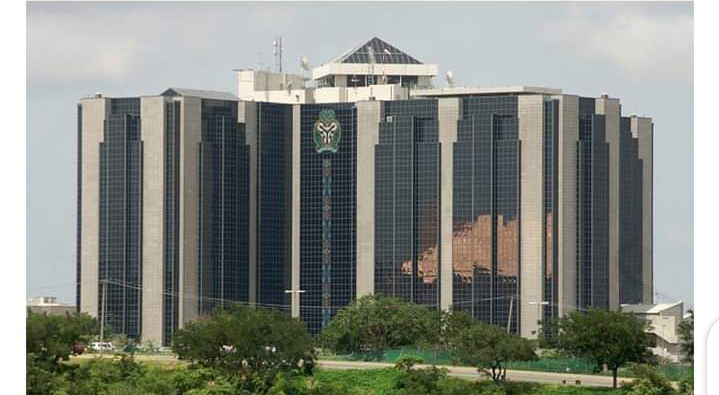

The Central Bank of Nigeria (CBN) has directed deposit money banks in the country to start charging 0.5% cybersecurity levy on some transactions done by their customers.
The apex bank gave the directive in a circular dated May 6, 2024 and sent to all commercial, merchant, non-interest and payment service banks as well as mobile money operators and payment service providers.
“Following the enactment of the Cybercrime (Prohibition, Prevention, etc) (amendment) Act 2024 and pursuant to the provision of Section 44 (2) (a) of the Act, ‘a levy of 0.5% (0.005) equivalent to a half percent of all electronic transactions value by the business specified in the Second Schedule of the Act’, is to be remitted to the National Cybersecurity Fund (NCF), which shall be administered by the Office of the National Security Adviser (ONSA),” the circular partly read.
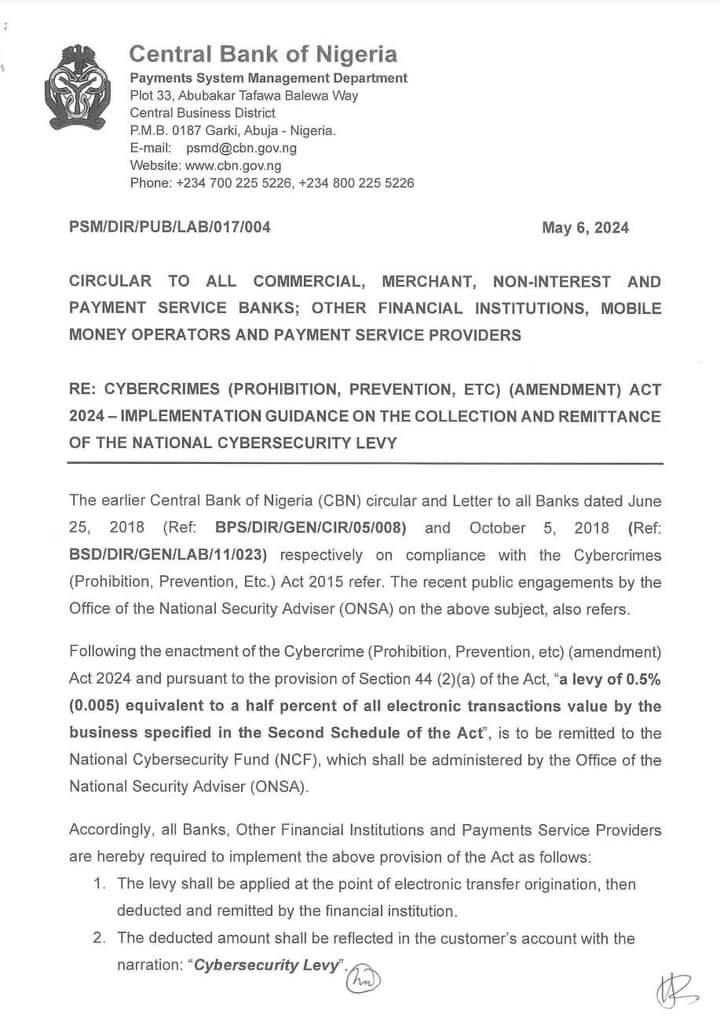

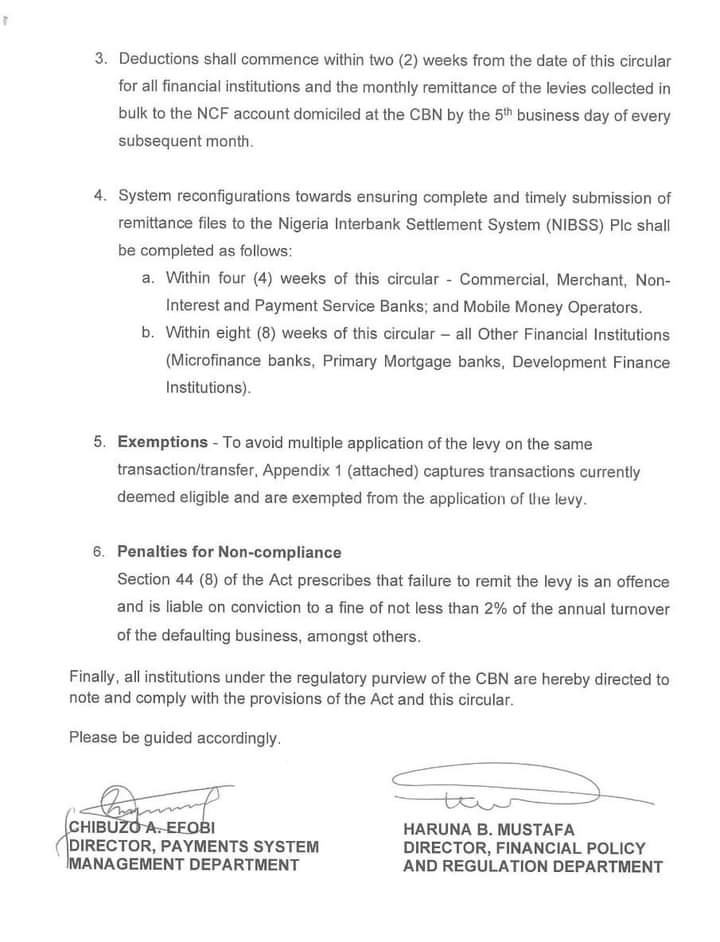

The apex bank said that the implementation of the levy would start two weeks from the date of the circular.
“The levy shall be applied at the point of electronic transfer origination, then deducted and remitted by the financial institution. The deducted amount shall be reflected in the customer’s account with the narration, ‘Cybersecurity Levy’. Deductions shall commence within two weeks from the date of this circular for all financial institutions and the monthly remittance of the levies collected in bulk to the NCF account domiciled at the CBN by the fifth business day of every subsequent month,” the circular said
The apex bank added that this new levy will not be applied on transactions such as loan disbursements and repayments, salary payments, intra-account transfers within the same bank or between different banks for the same customer, intra-bank transfers between customers of the same bank.
Also exempted from the levy were inter-branch transfers within a bank, cheque clearing and settlements, Letters of Credits, Banks’ recapitalisation-related funding only bulk funds movement from collection accounts, savings and deposits including transactions involving long-term investments, among others.
This current implementation however is not sitting well with some netizens as they reacted to the new development.
Here were some of their reactions from X.
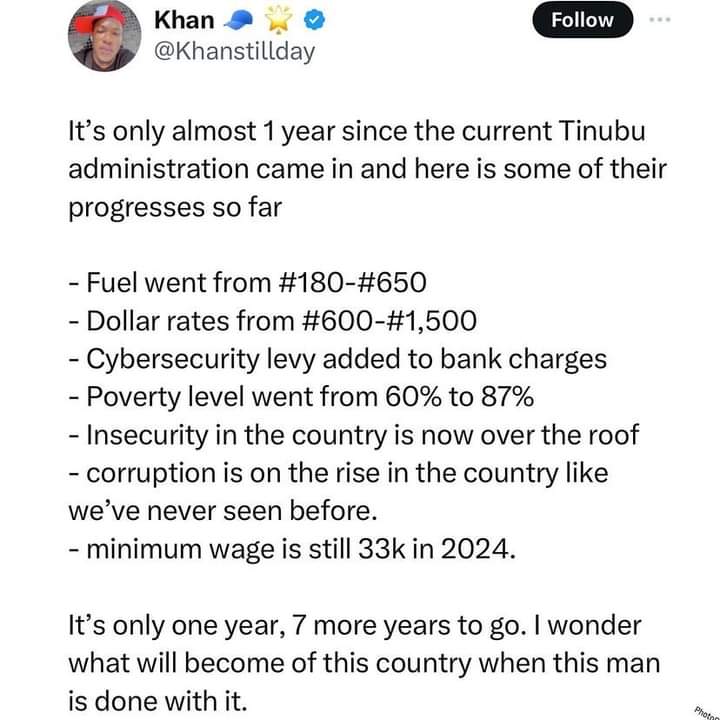



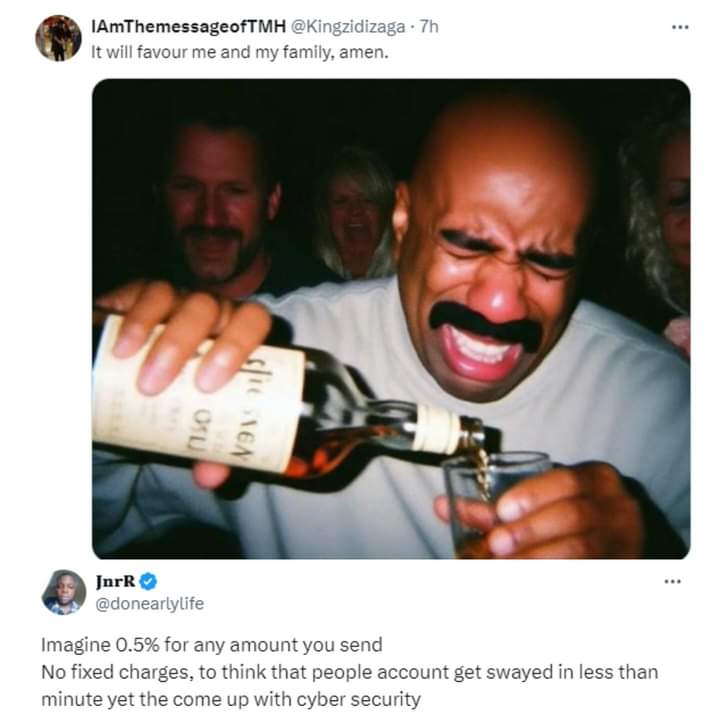

Finance
EFCC Chairman Tasks Nigerian Youths Against Crimes And Fraudulent Acts


The Chairman of Economic Finance Crime Commission (EFCC), Ola Olukoyede, has stressed the need for Nigerian Youth to see themselves as agents of positive change that have a lot to contribute to the socioeconomic development of the Nation.
Speaking at the 2nd edition of a Leadership Trainings Programme in Abuja, Olukoyede, who was represented by the Head Enlightenment and Re-orientation unit, (EFCC), Aisha Mohammed, said the commission’s dream is to see the youth contribute meaningfully to the society, emphasizing on the need to work together in bringing positive change to society.
The Economic and Financial Crimes Commission Boss declared the readiness of his agency to work with all Stakeholders, including the youth towards changing the narrative and reposition the country to greater exploit.
Also speaking, the representative of the Executive Secretary of Tertiary Education Trust Fund (TETFUND), Sonny Echono, appealed to the youths is to eschew social vices that could deter their full potential in life.
Other speakers at the event, including the Chairperson, Zero Tolerance for Social Immoralities Initiative (ZEITI) Africa, Rasak Jeje called on all stakeholders to join hands in collective pursuit of empowering new generation of leaders to curb the rising tides of social Vice among Nigerian youths.
The Chairperson, Zero Tolerance for Social Immoralities Initiative (ZEITI) Africa, Rasak Jeje made the call while addressing journalists at the 2nd edition of it Leadership Trainings Programme in Abuja on Thursday.
He said the training was aimed to intimate students leaders with knowledge and insights that will help them drive positive change and become exemplary leaders in their respective spheres.
Finance
AISA Has Refunded The Fees Paid By Yahaya Bello To EFCC


The Economic and Financial Crimes Commission (EFCC) says the American International School Abuja (AISA) has refunded the fees paid by the immediate past governor of Kogi state, Yahaya Bello, for his children attending the school.
In response to a letter addressed to the Lagos zonal commander of the EFCC, the school said $845,852 was paid in tuition “since the 7th of September 2021 to date”.
AISA said the sum to be refunded is $760,910 because it had deducted educational services already rendered.
“Please forward to us an official written request, with the authentic banking details of the EFCC, for the refund of the above-mentioned funds as previously indicated as part of your investigation into the alleged money laundering activities by the Bello family.
Since the 7th September 2021 to date, $845,852.84 (Eight Hundred and Forty-Five Thousand, Eight Hundred and Fifty Two US Dollars and eighty four cents) in tuition and other fees has been deposited into our Bank account.
We have calculated the net amount to be transferred and refunded to the State, after deducting the educational services rendered as $760,910.84. (Seven Hundred and Sixty Thousand, Nine Hundred and Ten US Dollars and Eighty Four cents).
No further additional fees are expected in respect of tuition as the students’ fees have now been settled until they graduate from ASIA.”
In a chat with The Cable, the spokesperson of the EFCC, Dele Oyewale, confirmed that the school has refunded the money.
‘’The money has been paid into public account,” Dele Oyewale was quoted as saying
-



 News4 days ago
News4 days agoFirst Man To Receive Pig Kidney Transplant Has Died
-



 Politics4 days ago
Politics4 days ago“Supporting Sim Fubara Was A Mistake” – Wike Announces
-



 Health4 days ago
Health4 days agoFP2030 Report Links Family Planning & Gender Equality
-



 Politics3 days ago
Politics3 days agoPresident Tinubu Bans Purchase Of Petrol-dependent Vehicles By FEC Members
-



 News3 days ago
News3 days agoMath Teacher Accused Of Having Sex With 2 Students And Getting Pregnant For One Tearfully Reveals The Baby Was Taken Away From Her
-



 Entertainment2 days ago
Entertainment2 days agoMen Of The Lagos State Police Command Have Arrested Singer Portable
-



 News16 hours ago
News16 hours agoThe Peruvian Government Has Officially Classified Transgender, Nonbinary And Intersex People As “Mentally ill”
-



 Entertainment17 hours ago
Entertainment17 hours agoWhy I’m Not Ready For Kids – Singer Burna Boy Reveals







